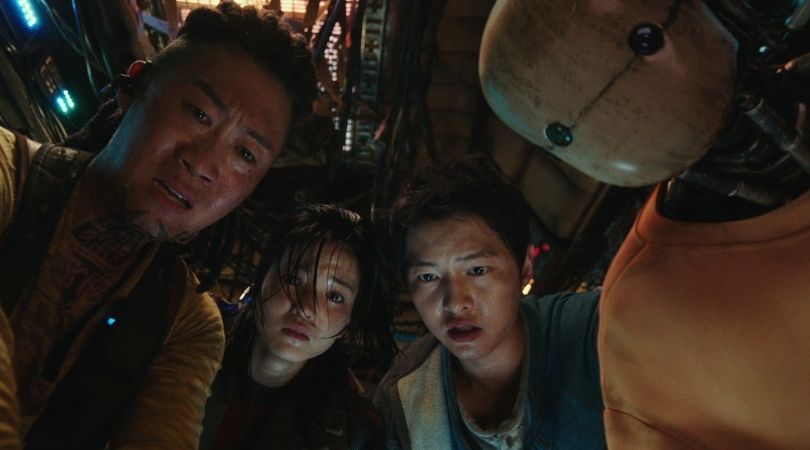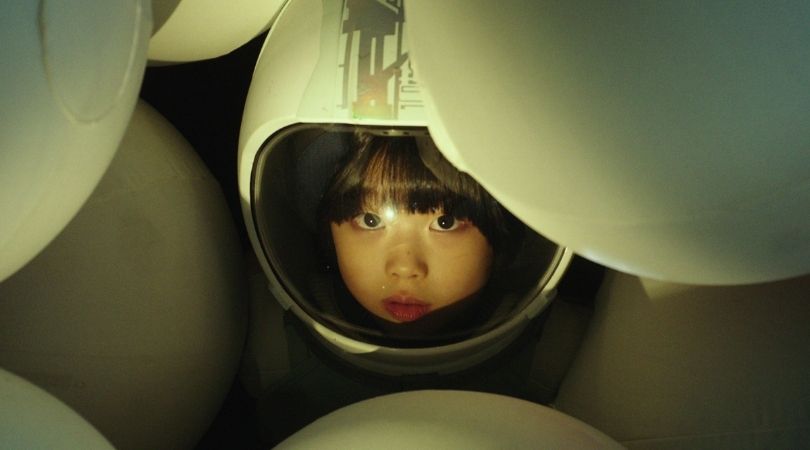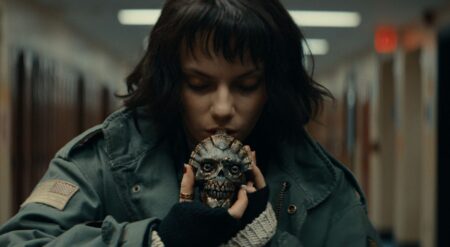
Space Sweepers captures all of the things I love about cyberpunk and does so with found-family, an international future, and a plan to save the Earth from corporate greed. Contrary to what Cyberpunk 2077 would have you believe, cyberpunk as a genre isn’t about the flashing neon lights and the ability to play as a corporate character. As a genre, cyberpunk deals directly with oppressive societies in dystopian futures that blend low-tech, high-tech, the rich, and the poor, by consistently juxtaposing them against each other. Instead of a gilded future of space travel, we see banal science fictive elements like work ships and grimey tech that seems both futuristic and out of date set against spectacularly rich elements of technology and bodily enhancements. There is a clear division in class, and in cyberpunk, your protagonist is often looking to obliterate the status quo even if it’s unwittingly at first.
Set in 2092, spaceship Victory is one of the many that live off salvaging space debris. Crewed with a genius space pilot Tae-ho (Song Joong-Ki), a mysterious ex-space pirate Captain Jang (Kim Tae-ri), a spaceship engineer Tiger Park (Jin Seon-kyu), and a reprogrammed military robot Bubs (Yoo Hae-Jin), spaceship Victory surpasses all other space sweepers. And yet, they’re broke. Not even just normal broke, but completely out of all credit anywhere broke. When the crew successfully snatches up a crashed space shuttle in the latest debris chase, they find a 7-year-old girl inside.
Of course, the surly and bitter crew don’t become parents immediately—well, Park does—but they do realize that she’s the humanlike robot wanted by UTS Space Guards. Wanted by both the corporate entity, UTS, which is ruling over the dystopian future that it both helped create and claims to want to save people from, and a terrorist group known as the Black Foxes, the crew makes an easy decision. Take the girl and offer a ransom in exchange for enough money to clear their debt, rebuild their ship, and get Tae-ho some damn shoes. But of course, none of that goes as planned and the crew of Victory starts on a path of familial bonding, love, and surprising moral growth that may not be easily bought.
Space Sweepers is directed by Jo Sung-hee and is a pure science fiction film that showcases beautiful action set pieces and space ship battles in tight quarters. It pushes the gas pedal as far as it can go. There are elements and nods to multiple films in the genre but never once does Space Sweepers seem like it’s trying too hard to fit into a mold.
Victory’s grime and grit is reminiscent of Alien‘s Nostromo and the way that technology can be futuristic but stripped to its most basic parts, clearly denoting class. Bubs’ personality has all the charm of the droids that came before them and offers up both humor and heart. Jang is a captain who enjoys her alcohol and has little to no care for situations that don’t directly affect her. Tae-ho is a man stricken by hidden grief that pushes him to keep trying to find answers. And Park is a former gangster with a heart of gold, a thick skull, and a penchant for swinging a titanium ax. As a whole, their dynamic works. The on-screen chemistry between each member is both caring, exciting, and authentic to the bickering that can only come from family.
While Space Sweepers puts the characters in dangerous situations and reveals their action-packed pasts, the film doesn’t lose sight of its emotional core. In fact, it takes time to routinely ground itself in the connections between the crew to showcase something more than space battles and evil corporations. All of that grounding is around the girl they found, her impact on them, and how they’re able to see something beyond just the next dollar thanks to her.
Now, with its focus on found-family, some elements of the film fall through the cracks, namely larger conversations about race. It gets brought up both in conversations about morality being determined by people’s DNA, and the fact that UTS citizens shown are majority white and English-speaking, while the space sweepers and other workers are made up of an international cast but predominantly people of color. In fact, Space Sweepers sets up the conversation well but fails to execute on the breadcrumbs it leaves for the real reasons behind UTS’s motives. Even with that misstep though, Space Sweepers directly confronts classism with a narrative that holds onto its cyberpunk identity.

With that said, Space Sweeper thrives in its visuals. From set design and costuming to gorgeously executed special effects work, the film is working overtime on creating a world for the viewer to step into. Every character is equipped with visible universal translators on an ear, allowing storytelling to happen in multiple languages. The costumes showcase the sterile nature of what is seen as perfection by UTS and the layered jackets and pops of color worn by the sweepers stand in opposition to that. The ship designs manage to strike a balance between run of the mill and inventive, especially when we get to see them in action.
Additionally, when characters are in enclosed spaces like the Victory or walking around the residential district while the ship is docked, there is a sense of claustrophobia imposed by the exposed wires and computer screens. This works well, showcasing the level of technology available to them, especially when compared to the wide-open and minimalistic tech of the UTS.
But the best part of Space Sweepers is Bubs. As a droid, Yoo Hai-jin does a phenomenal job. His voice work for the character is emotive. And when matched with the special effects team’s creation of digital faces on a blank rounded head, it brings out a charisma that automatically grabs you. Additionally, Yoo provided the physical performance for Bubs which is also spectacular, particularly in fights or when walking the hull of the ship. In fact, Bubs has both the finesse and life-like quality of the Star Wars droids that have captivated audiences.
While I tend to hate comparing pieces of media to others, I find myself without words to describe Space Sweepers. It hits on elements from sci-fi animated classics like Cowboy Bebop and brings space battles and tight base infiltration like Star Wars, all while presenting corporate overlords in the guise of “saving humanity” like just about every cyberpunk property there is. So why do I say this? Because of those elements and more, Space Sweepers is a must-watch for fans of the genre.
Space Sweepers strongly holds up the things that fans love and does so in a different way than what came before it. Sure, the film isn’t breaking down any doors, but it is easily one of my favorite science fiction films in the last five years. Visually, it’s strong. Character-wise, it’s strong. And even with its small moments of overlooking the issues it mentions, it never loses sight of what it wants people to feel: family. With Space Sweepers, Netflix continues to add phenomenal South Korean content to its platform, but more specifically, it continues to add great science fiction.
Space Sweepers is available now exclusively on Netflix.
Space Sweepers
-
Rating - 8.5/108.5/10
TL;DR
Space Sweepers strongly holds up the things that fans love and does so in a different way than what came before it. Sure, the film isn’t breaking down any doors, but it is easily one of my favorite science fiction films in the last five years. Visually, it’s strong. Character-wise, it’s strong. And even with its small moments of overlooking the issues it mentions, it never loses sight of what it wants people to feel: family. With Space Sweepers, Netflix continues to add phenomenal South Korean content to its platform, but more specifically, it continues to add great science fiction.






